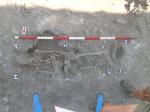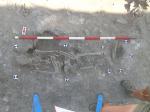Interpretation
-
- adult female skeleton buried in a built tomb. May have been part of a series of tombs (looks like there is another tomb just to the south; same alignment; same fill type; unexcavated in 2009.)
-
- Megan McNamee
- 24-7-2009
Stratigraphic Relationships
Site Photo
Description
- skeleton between narthex wall and the south wall of the cloister
- small tools, trowel
- earthen grave, perhaps use of coffin (laterally compressed clavicle, straight up and down)
- W-E
- poor
- poor
- W-E adult female skeleton between narthex wall and cloister. Head crushed. Lateral compression, clavichus nearly verticle, scapula vertical.
- Sammy Cox believes that the skeleton must have been buried in a tight space (i.e. coffin) because of the manner of decomposition. However, there is the remains of a tomb wall made of tufa (decomposing) and bricks.
- high
- mandible
- bone size, fusion
- construction - cut at knees
Articulation
Decomposition and Compression
- No
- A
- closed
- A
- A
- very vert.
- very oblique
- medial dx, sx
- no rotation Sx, missing Dx
- spine, clavical, head slightly, hands
- coffin? See observations in Description.

